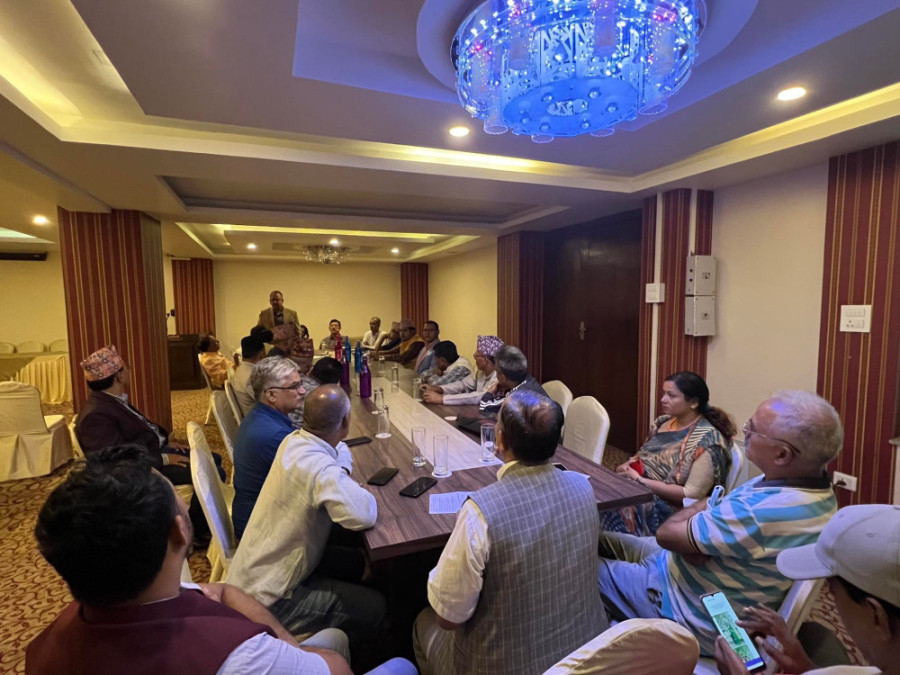Politics
Congress faction to drive a hard bargain on selection of election candidates
A leader close to Deuba admits that the establishment faction had been trying to corner the Koirala-Thapa camp.
Anil Giri
The crisis in the Nepali Congress over the issue of candidate selection for the upcoming federal and provincial elections seems to have reached the tipping point.
The party faction led by Shekhar Koirala has upped the ante, saying that they did not get a fair share when the party submitted the lists of proportional representation candidates for the November 20 elections. The Koirala camp has warned the party leadership to make corrections in the closed lists submitted to the Election Commission in order to ensure 40 percent candidates from their side.
Seat distribution in the five-party alliance led by the Congress remains unresolved with constituent parties not budging from their stands. When the Congress is already under pressure over the number of constituencies in which it can field its candidates, threats of non-cooperation during the elections from the rival camp have further complicated things.
The rival camp accuses party President Sher Bahadur Deuba, who is also the prime minister, of distributing tickets in the local elections unilaterally. The Koirala camp is backed by party Vice-president Dhan Raj Gurung, General Secretary Gagan Thapa, and Joint Secretaries Badri Pandey and Jeevan Pariyar.
Sanjay Gautam, a leader from the Koirala-Thapa camp, said: “We are protesting the establishment faction’s unilateral decisions.”
On Monday morning, dozens of leaders and cadres belonging to the Koirala-Thapa camp staged a protest at the party headquarters in Sanepa demanding corrections to lists of proportional representation candidates submitted to the Election Commission. According to the camp, Deuba has accommodated hardly 10 percent of their candidates.
“We are not going to accept the candidate list. Deuba violated the spirit of party unity by accommodating the wives of leaders, contractors and those who have made no contribution to the party,” said Gautam. “We cannot compromise just to accommodate the Maoist Centre and others. If Deuba fails to manage his own party, we will definitely revolt and there will be no alliance.”
There are suspicions over whether the five-party alliance will remain intact as the nomination day for first-past-the-post candidates inches closer. Congress members fear the Maoist Centre could jump ship, at a time the CPN-UML is offering its former ally more seats than what the Congress could give. As the factional divide in the Congress widens, Maoist leaders for their part fear if Congress votes can be transferred to an alliance candidate.
Koirala-Thapa camp leaders have warned not only their party leadership, but also other parties in the alliance about the electoral prospects of the constituent parties when the faction revolts and urges voters to vote only for Congress candidates.
Deuba appears to be committed to protecting the alliance of parties that catapulted him to the prime minister’s post. Of the 165 seats up for grabs in the federal first-past-the-post elections, the Congress wanted 100. But due to pressure from coalition partners, the party is now reportedly prepared to settle for around 86 seats. The ruling alliance has so far agreed on the distribution of 135 electoral constituencies, according to Rajendra Shrestha, the minister for federal affairs and general administration.
“Top party leaders and task force members have almost settled the row over 135 electoral constituencies. In-depth discussions are taking place to sort out the remaining 30 constituencies. The alliance has even started discussions on seat-sharing for provincial assemblies,” said Shrestha, a leader of Janata Samajbadi Party Nepal. There would be some sort of a settlement by next week, he added.
On Monday morning, second-rung leaders of the Koirala-Thapa camp held a meeting and decided to cooperate with coalition candidates in the upcoming elections if Deuba is ready to ‘correct’ the list of proportional representation candidates.
“Otherwise, we will field our own candidates with the support of parties outside the coalition,” a leader from the rival camp said. “We have given Deuba six days to correct the PR list. Otherwise, we will join hands with the CPN-UML, Loktantrik Samajbadi Party and others.”
Some top leaders from the rival Congress camp have reportedly met with UML Chairman KP Sharma Oli to discuss the prospect of cooperation if Deuba does not give them a respectable position in the party. Oli is learnt to have given them word that his party would collaborate with the dissidents in the elections.
“We will continue our protest at the party headquarters until the establishment faction is ready to correct the proportional representation list,” said Jagadish Narsingh KC, another leader from the Koirala-Thapa camp.
The camp has invited leaders to a tea reception on Thursday. If the establishment faction does not address their concern, they would announce further protests, said KC.
Another leader of the camp told the Post that Deuba has already felt the heat and summoned Koirala for talks. Koirala was scheduled to return to Kathmandu from Biratnagar on Monday evening. If there is no agreement between Deuba and Koirala, said the leader, “we will move on”.
A leader close to Deuba admitted that the establishment faction had tried to corner the Koirala-Thapa camp. “There was no need for that,” the leader said, wishing not to be named. “Though Koirala and Thapa are looking for 40 percent share in tickets, they can accept a 30 percent deal.”
The issue is not of proportional representation alone, said Ajay Babu Siwakoti, a central committee member. “We fear Deuba will corner us and distribute tickets unilaterally.”
“Deuba has communicated to us that he would manage the dissatisfaction over ticket distribution but it is not easy. We are looking for fair shares in all elections—proportional representation and direct elections in both federal and provincial polls,” said Siwakoti.




 13.12°C Kathmandu
13.12°C Kathmandu














